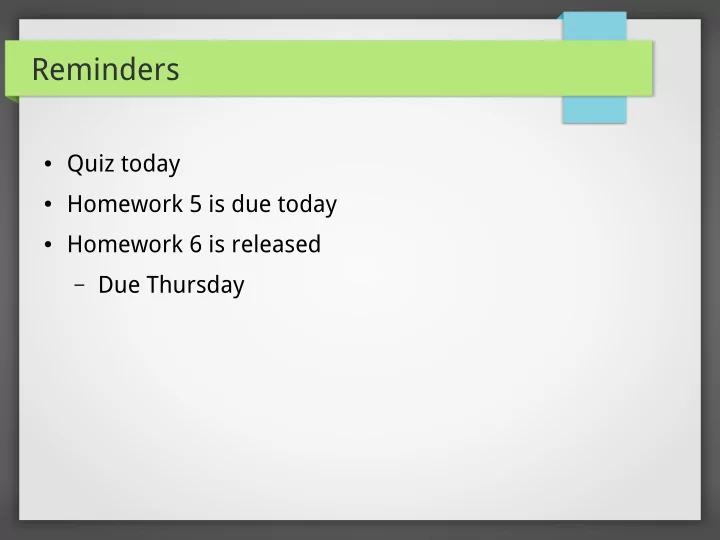

Reminders ● Quiz today ● Homework 5 is due today ● Homework 6 is released – Due Thursday
Process 1. Express statement as “for all n ≥ b , P(n)” for some b 2. Write “Basis Step” and show P(b) is true 3. Write “Inductive Step” 4. “Assume P(k) is true for arbitrary k” (hypothesis) 5. “Prove P(k) → P(k+1)” being explicit about P(k+1) 6. “This completes the inductive step” 7. Conclude the proof with “By mathematical induction, P(n) is true for all n ≥ b”
Examples ● Prove that if I have a sequence of dominos lined up correctly, I can topple all of them. ● If n is a positive integer, then ● Prove for
Strong Induction ● Similar to regular mathematical induction ● Sometimes, we can't complete inductive step ● Instead, inductive hypothesis shows: – If P(j) is true for all positive integers not exceeding k , then P(k+1) is true – ie: Assuming P(j) is true j = 1, 2, …, k
Example ● All positive integers ≥ 2 can be written as product of primes ● Prove every amount of postage 12 cents or more can be formed using just 4-cent and 5-cent stamps
CMSC 203: Lecture 14 Recursive Algorithms
Recursion ● Define an object in terms of itself ● For example, defining a sequence by specifying how terms are found from previous terms ● Can use induction to prove results are correct
When Can I Use It? ● If the reduction of the problem on one input to a smaller input is still valid ● Solution to original problem can be found with sequence of reductions ● Some initial case must be established
Examples ● Computing procedure factorial (n: nonnegative integer) if n = 0 then return 1 else return n * factorial ( n – 1) ● Computing procedure power ( a : nonzero real, n : nonnegative int) if n = 0 then return 1 else return a * power ( a , n - 1)
Iteration ● Iterative Procedure - Use recursive definition successively to find values of function at larger integers ● May require much less computation than recursion procedure fibonacci ( n : nonnegative integer) if n = 0 then return 0 else if n = 1 then return 1 else return fibonacci ( n – 1) + fibonacci ( n – 2)
Merge Sort ● Iteratively split list into two sublists of equal length – Or have one sublist with one more element ● Continue until each sublist has one element ● Successively merge pairs of lists ● O(n log n)
Quick Sort ● Take first element (a 1 ) and form two sublists – One contains elements less than a 1 – Second contains elements greater than a 1 ● Place a 1 at the end of the first sublist ● Repeat recursively until all sublists contain 1 item ● Combine sublists of 1 item in order they occur ● O(n log n) in practice
Recommend
More recommend